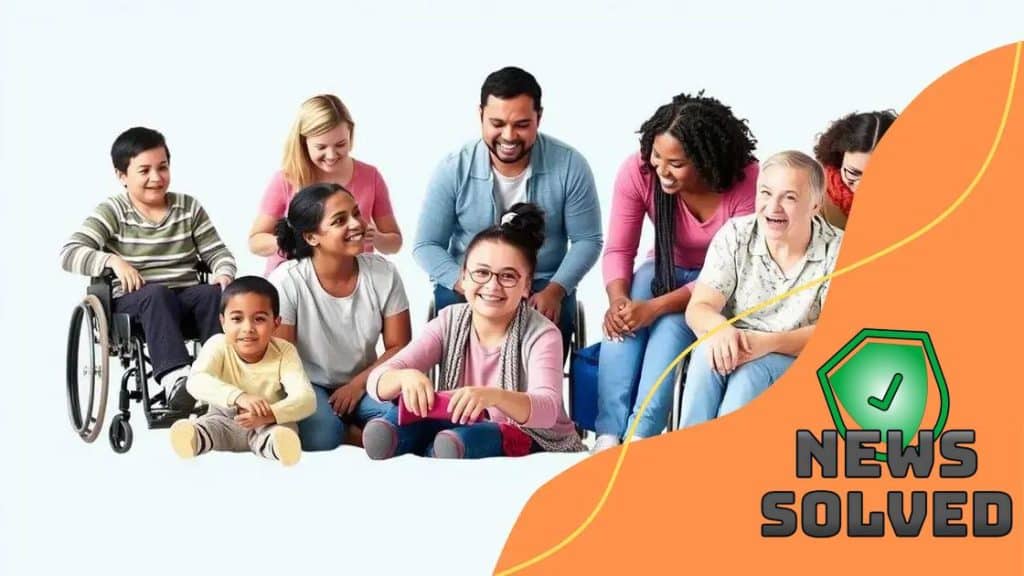Federal financial assistance for people with disabilities

Advertisements
Federal financial assistance for people with disabilities includes programs like SSDI and SSI, providing vital support for medical costs, living expenses, and enhancing independence.
Federal financial assistance for people with disabilities is essential for promoting independence and improving quality of life. Have you considered how such programs could impact your daily routine? In this article, we’ll dissect various aid options available to ensure you or your loved ones get the support you need.
Advertisements
Understanding federal financial assistance programs
Understanding federal financial assistance programs is crucial for individuals with disabilities seeking support. These programs can help enhance independence and improve daily living conditions. Various government initiatives are designed to provide financial aid for qualified individuals.
Types of Federal Financial Assistance Programs
Several types of programs exist to assist people with disabilities. Each program has unique requirements and benefits. Here are a few key types:
- Social Security Disability Insurance (SSDI)
- Supplemental Security Income (SSI)
- Medicaid
- Housing Assistance
These programs can provide financial resources for medical care, housing, and everyday expenses. It’s important to know which program best suits your needs.
Advertisements
Eligibility Criteria
Eligibility for these programs often depends on your income, work history, and the severity of your disability. For instance, SSDI requires that you have worked for a certain period, while SSI is based on financial need. Understanding these criteria can help you apply effectively.
Additionally, many local agencies provide assistance with the application process, making it easier to navigate the complex requirements. Don’t hesitate to reach out for help!
Another critical aspect is keeping up with your application status. Timely response from the agencies involved is essential, as it ensures that you receive the support you need in a timely manner.
Resources for Assistance
There are numerous resources available to assist you in understanding and applying for federal financial assistance programs. Online platforms, local advocacy groups, and government agencies can provide the necessary guidance.
- National Council on Independent Living (NCIL)
- Centers for Independent Living (CILs)
- State disability agencies
By utilizing these resources, you can gain valuable knowledge and support, helping you to achieve a better quality of life.
Eligibility criteria for disability assistance
Eligibility criteria for disability assistance are essential for determining who can receive benefits. Understanding these requirements can help individuals navigate the application process more effectively. Each program has specific criteria, but there are common elements across many federal assistance programs.
Common Eligibility Requirements
For most assistance programs, applicants must meet several key requirements. Here are some important factors to consider:
- Disability status: You must provide documentation proving that you have a qualifying disability.
- Income limits: Your financial situation plays a significant role. Programs like Supplemental Security Income (SSI) have strict income limits.
- Work history: Programs such as Social Security Disability Insurance (SSDI) require applicants to have a certain amount of work credits.
- Age and residency: Some programs have age requirements or require you to be a resident of the U.S.
Understanding these requirements can simplify the application process. Individuals should gather all necessary documents to prove their eligibility. This may include medical records, tax returns, and proof of work history.
Application Process Insights
The application process for disability assistance can vary based on the program. It’s crucial to familiarize yourself with the specific steps necessary for each program.
Many applicants find it helpful to seek guidance from professionals or local advocacy groups that specialize in disability services. These organizations can provide invaluable support and ensure that you meet all requirements before submitting your application.
Keeping your documentation organized is key. Be proactive in checking the status of your application and responding to any requests for additional information promptly.
Types of financial aid available

Understanding the various types of financial aid available for people with disabilities can open doors to necessary support. Several programs provide unique benefits tailored to assist individuals in achieving greater independence.
Government Programs
Government financial aid is essential for many. Two major programs include:
- Social Security Disability Insurance (SSDI): This program provides benefits to individuals who have worked and paid into the Social Security system and have become disabled.
- Supplemental Security Income (SSI): Unlike SSDI, SSI is based on financial need and is available to individuals with limited income and resources.
These programs are designed to help cover living expenses, medical care, and other essential needs.
State and Local Assistance
In addition to federal programs, many states and local governments offer additional financial assistance. This can include:
- State Disability Insurance: Some states provide their own disability insurance programs to offer extra support.
- Housing Assistance: Programs that help individuals with disabilities find affordable housing options.
- Transportation Aid: Assistance with public transportation costs or special transportation services.
These programs can vary widely depending on where you live, so it’s important to research what is available in your area.
Nonprofit Resources
Numerous nonprofit organizations also offer financial aid for disabled individuals. These organizations often focus on specific needs, providing targeted assistance. Examples include:
- Grants for home modifications: Helping individuals adapt their living spaces for accessibility.
- Education scholarships: Funding for students with disabilities pursuing higher education.
- Emergency financial assistance: Short-term help for individuals facing unexpected expenses.
Nonprofits can be a great resource. They often provide not just financial assistance but also advocacy and support services to help individuals navigate various systems.
How to apply for assistance
Knowing how to apply for assistance is key for individuals with disabilities seeking support. The application process can be straightforward if you understand the necessary steps and requirements.
Gather Required Documentation
The first step in applying is to gather all necessary documents. This includes:
- Proof of identity: A government-issued ID or Social Security card.
- Medical documentation: Evidence of your disability, which may include health records from doctors.
- Financial information: Bank statements, tax returns, and other relevant financial documents.
Organizing these documents beforehand can make the application process smoother.
Choose the Right Program
Different assistance programs have specific eligibility criteria. It’s essential to choose the program that best fits your situation. Research available options such as:
- Social Security Disability Insurance (SSDI)
- Supplemental Security Income (SSI)
- State-level aid programs
Each program has its own application process, so ensure you understand the requirements for the one you select.
Complete the Application Process
Once you have gathered the required documents and selected a program, you can begin the application. This process can often be done online. When filling out your application:
- Be thorough: Provide complete and accurate information to avoid delays.
- Double-check your forms: Ensure there are no errors before submission.
- Seek assistance if needed: Don’t hesitate to contact support services if you have questions.
After submission, it’s important to track your application’s progress. Most programs provide a way to check the status online.
Patience is essential, as the review process can take time. Stay proactive by following up if you don’t hear back within the expected timeframe.
Resources for navigating financial aid applications
Navigating financial aid applications can be challenging, but several resources are available to assist individuals with disabilities. Utilizing these resources can help make the process more manageable and efficient.
Online Tools and Platforms
There are many online tools designed to simplify the application process. Some useful websites include:
- Benefits.gov: This government website helps you find and apply for benefits.
- Social Security Administration: Provides information about Social Security disability programs and online application services.
- State government websites: Many states have dedicated sites with local programs and resources.
These platforms often have step-by-step guides to assist with filling out applications correctly.
Local Advocacy Groups
Advocacy groups play a critical role in helping individuals understand their options. Local organizations can provide valuable support, including:
- Application assistance: Trained staff can help you fill out forms and navigate complicated requirements.
- Workshops and seminars: Many organizations offer informational sessions about financial aid.
- Peer support: Connecting with others who have gone through the process can provide encouragement and guidance.
It’s beneficial to reach out to these groups for personalized help, especially if you face challenges.
Professional Consultants
At times, hiring a professional consultant may be beneficial. These experts can help you understand complex applications and improve your chances of approval. Look for:
- Disability advocates: Professionals who specialize in assisting with disability claims.
- Financial advisors: Consultants who understand specific financial aid programs relevant to disability.
Consultants can tailor their approach based on your specific needs and circumstances, making the application process smoother.
Exploring various resources helps ensure you obtain the aid you deserve. By utilizing online tools, local advocacy groups, and experts, you can navigate the financial aid landscape more easily.
FAQ – Frequently Asked Questions about Federal Financial Assistance for People with Disabilities
What types of federal financial assistance are available for people with disabilities?
People with disabilities can access various programs, including Social Security Disability Insurance (SSDI), Supplemental Security Income (SSI), and Medicaid.
How do I know if I am eligible for disability assistance?
Eligibility typically depends on your disability status, financial situation, and work history. Each program has specific criteria you must meet.
What documents do I need to apply for assistance?
You generally need proof of identity, medical documentation of your disability, and financial information such as tax returns and bank statements.
Where can I find resources to help with my application?
You can explore online tools like Benefits.gov, reach out to local advocacy groups, and consider hiring professional consultants for assistance.





